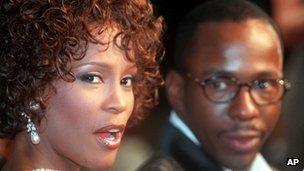Whitney Houston dies: The rise and fall of a superstar
- Published

Whitney Houston admitted abusing cocaine, marijuana and pills in her later career
US singer and actress Whitney Houston has died in Los Angeles, aged 48. We look back at the rise and tragic fall of a superstar.
For the golden girl of the music industry from the mid-80s to the late 90s, Whitney Houston's decline, when it came, was spectacular.
Her once serene image, matched by her majestic voice, was shattered by drug use in her later career and has come to be seen as a cautionary tale.
Houston was born with unusually good musical genes. She was the daughter of gospel singer Cissy Houston, cousin of 1960s pop diva Dionne Warwick, and the goddaughter of Aretha Franklin.
From the age of five, young Houston was singing gospel songs in the New Hope Baptist Church in Newark, New Jersey.
She spent her youth singing backing vocals to such artists as Chaka Khan, Lou Rawls and her own mother.
She was soon spotted in a Manhattan night club by the head of Arista Records, Clive Davis, and, at the age of 19, was signed up virtually on the spot.

In recent years drug use took its toll on the star, and her famous voice was badly damaged
Davis picked only the most respected songwriters for Houston's first eponymous album. When it was released in 1985, it became the biggest-selling album by a debut artist.
It spawned several hits including Grammy winner Saving All My Love for You, How Will I Know, You Give Good Love, and The Greatest Love of All.
She enjoyed seven consecutive number one singles in the US, surpassing the Beatles.
Tumultuous marriage
Her 1987 hit album Whitney included the hits Where Do Broken Hearts Go and I Wanna Dance With Somebody.
By the late 1980s, she had become one of the world's best-selling artists and the most successful soul singer of all time, notching up worldwide album sales of 200 million.
Her effortless and powerful vocals also brought success in Hollywood.
In 1992 she starred in The Bodyguard, which also gave her the memorable number one hit I Will Always Love You - a cover of a Dolly Parton song.
It was the Grammy record of the year and remained at the top of the charts for weeks.

Whitney Houston and Bobby Brown were married for 14 years before their acrimonious divorce
But her role in the film proved uncomfortably close to the truth. Rumours gathered force that Houston had developed a diva mentality, that she was difficult to work with and increasingly unpunctual.
Houston returned to the big screen in 1995 and 1996 with Waiting to Exhale and The Preacher's Wife - both spawning soundtrack albums, and another hit studio album.
But she had started to abuse drugs - cocaine, marijuana and pills - and the hits stopped.
Her behaviour became more and more erratic. In 1992 she married hip-hop singer Bobby Brown, with whom she had a daughter, Bobbi Kristina, but their tumultuous relationship became a public spectacle.
They later divorced in April 2007 and Houston was granted custody of Bobbi Kristina.
Houston's once flawless voice became raspy and hoarse, and she was unable to hit the high notes for which she had become famous.
Paul Gambaccini, broadcaster and music journalist: "A great talent squandered"
She checked into rehab clinics twice before declaring herself drug-free in 2010 - but in the interim, she missed concert dates and was stopped at an airport due to drugs.
She was so thin during a 2001 Michael Jackson tribute concert, that rumours spread she had died the next day.
She told ABC's Diane Sawyer in 2002: "The biggest devil is me. I'm either my best friend or my worst enemy."
Houston tried to stage a comeback with the 2009 album I Look To You, but things fell apart when a concert to promote the album was clearly off-key.
Broadcaster and music journalist Paul Gambaccini described Whitney Houston's voice as "the template for female vocal performers for the last 30 years".
But in the end, he told the BBC, she became the victim of a "self-administered decline" and, sadly, threw all it all away.
"It's always a tragedy; it's a life lost, a great talent squandered," he said.